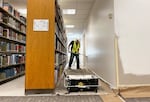
Cleanup at the Branford Price Millar Library at Portland State University is underway, May 6, 2024, after protesters occupied the library for several days last week.
Tiffany Camhi / OPB
When Cris Paschild learned that demonstrators protesting the war in Gaza were occupying Portland State University’s library on April 29, she immediately headed to campus. As the head of the Branford Price Millar Library’s special collections and the university’s archivist, she felt compelled to protect the library somehow. But there was little she could do when she arrived that night. Protesters had blocked off entrances into the library. Paschild said she paced outside, watching the bright lights of the fire alarms flashing inside.
The next morning, Paschild explained who she was to protesters guarding the entrance to the library. They eventually let her in and together they worked to clear out and secure the library’s special collections.
“They actually were really receptive and seemed to hear what I was saying and what my concerns were,” Paschild told OPB. “I appreciated that.”
Protesters barricaded the entrance to the archives with furniture and put up signs directing people to protect the area. Paschild left and hoped for the best. A few days later police cleared out protesters occupying the library.
Paschild returned on a guided tour of the library last Friday. The university’s special collections, home to one-of-a-kind, historical community archives, appeared to be intact.
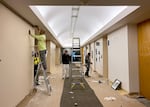
Cleanup at the Branford Price Millar Library at Portland State University is underway, May 6, 2024, after protesters occupied the library for several days last week.
Tiffany Camhi / OPB
PSU is still in the process of understanding the scope of the damage to the building. Although most of the library’s books came out of last week’s occupation unscathed, some in the campus community feel hurt that protesters chose to take over an open resource to the community and the heart of the university.
Why protesters chose the library
The Millar Library is one of the few buildings on Portland State’s campus that does not require identification to enter. The university kept the building open not only as a resource for its students and staff, but also for the wider community.
But the library’s open door also meant it was an easy target for protesters looking to occupy a building.
A weekend post from an Instagram account associated with the Portland State protesters said the library was chosen because similar institutions have been occupied by student protesters in the past. Student protests over the Vietnam War in 1968 famously occupied Low Library at Columbia University.
“The library is a place of great power, great learning and great resources,” said Bug, a non-student organizer involved with the Millar Library occupation last week. Bug has asked not to be named due to fear of repercussions. “We as a group were there to inspire and request peace, no more destruction.”
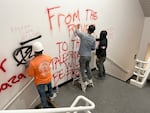
Cleanup at the Branford Price Millar Library at Portland State University is underway, May 6, 2024, after protesters occupied the library for several days last week.
Tiffany Camhi / OPB
Organizers of the occupation maintain that the library remained open to students and faculty who needed access to it, but access to the building was restricted with guards posted outside the main entrance. They also said they took care to not destroy the library’s main resource: books.
“Every individual I spoke with was there to truly protest genocide, for non-violence,” Bug said. “We were all actively discouraging any acts of destruction to the books and archives.”
That effort to protect books did not extend to windows, doors, furniture and computers in the library, some of which were damaged or graffitied during the time the library was taken over. Bug said the damage that did occur to university property does not compare to the destruction and violence that has occurred in Gaza.
Cleanup and restoration begins
At this point, it’s unclear exactly how much it will cost Portland State to undo the damage done to Millar Library, but it’s sure to be a hefty insurance claim for the school.
The university filled two 40-yard dumpsters with the wooden pallets, trash cans, sheets of plywood and other debris used to barricade the library last week.
“The amount of debris was completely overwhelming,” said Cary Morris, Portland State’s assistant director of operations and maintenance. “It was like something I’ve never seen before.”
During the occupation, protesters graffitied the exterior and interior of the library with slogans such as “Free Palestine” and “Disarm PSU.” All five floors of the library had some sort of graffiti on the walls. Protesters used furniture like tables, chairs and sofas to block off doorways and stairwells. Fire alarms were ripped out and disabled.
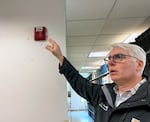
Cary Morris, assistant director of Operations and Maintenance at Portland State University, points out damage done to a fire alarm, May 6, 2024, after protesters occupied the library for several days last week.
Tiffany Camhi / OPB
But Morris, who has been overseeing parts of the cleanup since Friday, noticed the library’s books were largely undisturbed.
“The book stacks seem pretty untouched,” Morris said. “There was a lot of graffiti and signage that said, ‘leave the books alone’ or ‘don’t touch the books.’”
The university’s Dark Horse Comics collection, which had originally been reported as missing or stolen, also appeared to be intact.
Progress made
A week after the initial occupation began, the Millar Library looks much different today. Hallways and rooms that were filled with donated food, water bottles, clothing and medical supplies last week are now replaced with canvas drop cloths and buckets of paint. Several contractors were inside the building Monday sanding off graffiti, repainting the walls and repairing building safety features. About a dozen library staff were allowed to roll in carts to take home electronics and other supplies from their offices so they could work from home over the next several months.
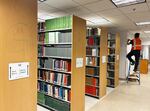
Cleanup at the Branford Price Millar Library at Portland State University is underway, May 6, 2024, after protesters occupied the library for several days last week.
Tiffany Camhi / OPB
In a letter to the campus community, Portland State President Ann Cudd said she hopes the library will be able to reopen in time for the beginning of the university’s fall term on Sept. 30.
Paschild said library staff are doing the best they can to deliver resources to students as they enter the second half of spring quarter. The school has set up a satellite reference desk for students and it is actively looking for alternative tutoring and study spaces across campus. But the university’s main community space will be closed for the remainder of the school year.
People who worked in the library were proud to offer its resources to everyone in the Portland area, Paschild said. She worries the university may clamp down on access when the library reopens.
“We’re grieving, we’re sad, we’re hurt and we’re confused,” Paschild said of the university’s library staff. “But we’re also just on the ground working right now.”
